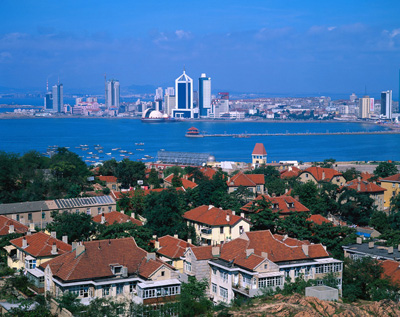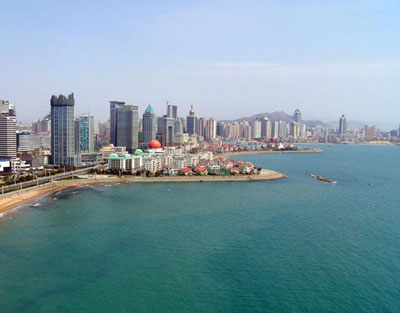|
 Qingdao, home to the only internationally recognized
Chinese beer, is the biggest maritime city of Shandong
Province. With an annual beer festival and beaches up
and down the coast, Qingdao is a student's paradise.
In international history, Qingdao was once a Germany
colony, and still retains the German style architecture
in its central district and churches. From a Chinese
point of view, the Province of Shandong in which Qingdao
is situated is really the heartland of China. The birthplace
of philosopher Confucious and writer Lu Xun, and even
the reputed place of origin of football, a study visit
to Shandong's Qingdao city gives you a real taste of
China, ancient and modern. Qingdao, home to the only internationally recognized
Chinese beer, is the biggest maritime city of Shandong
Province. With an annual beer festival and beaches up
and down the coast, Qingdao is a student's paradise.
In international history, Qingdao was once a Germany
colony, and still retains the German style architecture
in its central district and churches. From a Chinese
point of view, the Province of Shandong in which Qingdao
is situated is really the heartland of China. The birthplace
of philosopher Confucious and writer Lu Xun, and even
the reputed place of origin of football, a study visit
to Shandong's Qingdao city gives you a real taste of
China, ancient and modern.
 Qingdao, meaning 'lush island', is scenically located
between the Taoist mountains of Lao Shan and the East
China Sea. Lao Shan, only 30 kilometers away from the
city, is the nearest mountain range. The spring water
from Lao Shan is used to make the local favourites, Lao
Shan Beer and Lao Shan Cola. Qingdao's outlying beaches
are great for exploring and are best enjoyed from May
to October each year. With around three million city
dwellers in total, Qingdao's main expatriate community
comprises of some 60,000 South Koreans, from the nearest
country across the sea. Qingdao, meaning 'lush island', is scenically located
between the Taoist mountains of Lao Shan and the East
China Sea. Lao Shan, only 30 kilometers away from the
city, is the nearest mountain range. The spring water
from Lao Shan is used to make the local favourites, Lao
Shan Beer and Lao Shan Cola. Qingdao's outlying beaches
are great for exploring and are best enjoyed from May
to October each year. With around three million city
dwellers in total, Qingdao's main expatriate community
comprises of some 60,000 South Koreans, from the nearest
country across the sea.
| Qingdao's Buzzing Economy |
Selected as the host city for the sailing competitions
of the 2008 Olympics, modern-day Qingdao is an entrepreneurial
and forward-thinking hub of activity. Opportunities
are plenty in a city that reminds one of a miniature
Shanghai with high ambitions. Qingdao is now a manufacturing
center, and home to Haier
Corporation, a major electronics firm. As early
as 1984,
the Chinese government named Qingdao a Special
Economic Zone and as a result, the city had gone
through this amazing development of secondary and tertiary
industries. As an important trading port in the province,
Qingdao has gained a lot of investment, mostly from neighbours
in South Korea and Japan.
After Qingdao was colonised by Germany in 1897, it was
given a European flavour in its buildings, churches and
industries. When the First World War broke out in 1914,
Japanese invaders took over Qingdao and continued the
colonial rule.In protest against the then Chinese government
yielding to Japanese pressure, the famous May 4th Movement
was launched in 1919 and protestors demanded the resumption
of sovereignty over Qingdao.In 1938, the Japanese invaded
Qingdao again, but their occupation came to an end in
September 1945 when the KMT government regained control
of the city. In 1949 Qingdao was liberated.Still
strategic to this day, Qingdao is now not only a modern
port city, but also the headquarters of the Chinese navy's
northern fleet.
| Qingdao's Best Universities |
Studying at one of two of Qingdao's best universities,
Qingdao University and Ocean University China, will give
you an edge on all things to do with shipping and international
trade. With relatively few foreign students, the city's
economy is growing at such a pace that employment opportunities
abound in foreign representative offices and Chinese
manufacturing bases. Qingdao University offers a full
range of courses from humanities to sciences, whereas
Ocean University China has courses specializing in trade,
logistics and the environment of the sea.
Qingdao University (QU) is a new comprehensive university
in Shandong Province, which was combined with the former
Qingdao University, Shandong Textile Engineering Institute,
Qingdao Medical College and Qingdao Teachers' College
in 1993. Qingdao University comprises of 25 colleges
with undergraduate programs in languages, history, philosophy,
law, economics, management, natural sciences, engineering,
medical science, and education.
In 2001, the State Oceanic Administration
and Qingdao Municipal Government agreed to work on having
Ocean University China become a key institution, renowned
for its Marine Science. The Ocean University China offers
courses in Science, Engineering, Agronomy (Fisheries),
and Economics, among others. This university is especially
renowned for its Oceanography.As it is often stated,
Ocean University 'nestles against hills and faces the
blue sea'.
|